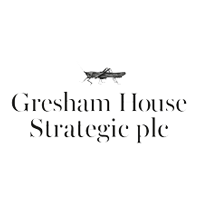Gresham House Strategic Plc (LON:GHS) Fund Manager & Managing Director Graham Bird talks to DirectorsTalk about the strong performance in its final audited results for the year ended 31 March 2017. Graham talks us through drivers from the portfolio, what he expects will drive the fund moving forward, Graham’s view on the markets & why do they focus on the smaller and value end of the spectrum and lastly with a maiden dividend announced today, should we expect good and growing dividends to be a key feature of this fund.
Chairman’s statement
I am pleased to report considerable progress having now completed our first full year as Gresham House Strategic operating under the strategic public equity (“SPE”) mandate managed by Gresham House Asset Management.
The objective of the strategy is to generate superior returns over the medium term by taking influential stakes mostly in smaller, profitable and cash generative UK public companies with the flexibility to invest in private or pre-IPO opportunities. You will find details of investments made to date in the Manager’s report.
We are now halfway into our first three year investing period and I am glad to report that our NAV at the start of the year was 995.7p and increased to 1071.8p by 31 March 2017. As I write, NAV has risen to 1187.7p, up 20.2% since GHAM’s appointment in August 2015.
As announced earlier, the policy of efficiently returning 50% of the profits from realisations (net of any losses, of which there were none last year) to shareholders has enabled us to propose our maiden dividend of 15p per share and, subsequent to the year end, to return a further £0.3 million by way of share buybacks. The Board is confident of its ability to afford a good and growing dividend over the long-term and as the portfolio matures.
As forecast last year, our ongoing costs have also declined to approximately 3% of NAV. It is our intention to scale GHS which will reduce the total expense ratio further over time.
This sounds and indeed is, all very positive. However, our discount to NAV remains at 23% as of 31 May 2017. GHAM has implemented a long-term plan to address this historic discount. Our managers have met with investors throughout the country and maintained a close dialogue with all forms of financial media. Nothwithstanding the rebuilding of the shareholder base welcoming several institutions, wealth managers and private investors to the shareholder register, much favourable publicity and further share purchases by the Board and the team at Gresham House, the discount remains.
The Board’s view is that there are four main reasons for this:
· GHS is a relative newcomer with a track record of 20 months adopting the SPE strategy within this platform
· We still hold a substantial amount of cash
· Our stake in IMImobile is a large proportion of the investments held at present which should reduce proportionately as the portfolio matures
· Our relatively small size
£9.9 million has been invested since April 2016, including £2.6 million since the year end, bringing the total invested since GHAM’s appointment to £15.8 million. The shares of IMImobile also continue to grow in value as the company delivers good organic growth, generates strong cash flows and executes on acquisitions benefiting from strong structural growth trends.
The Board remains alert to the discount, but believes the appropriate actions are being taken and that in the medium-term this discount will narrow as investors see the steady growth of NAV, and as our marketing and investor relations activities continue.
It is also very important to remember the advantage that closed-ended companies with permanent capital, which invest in relatively illiquid investments enjoy over open-ended funds. This was admirably demonstrated after the Brexit vote with open-ended property funds gating investors and changing withdrawal terms. There has also been much publicity recently about investment trusts that have raised dividends for up to 50 years consecutively and an increasing focus at the smaller end of the market which bodes well for GHS.
It should be recalled that in August 2016 we co-invested in the new Gresham House Strategic Public Equity Fund LP (sister fund to GHS, managed by the same team and adopting the same strategy, but targeting private equity investors) by committing to sell 3.9 million shares of IMImobile to the new fund structure at 193.5p. This had the effect of reducing our holding in IMImobile to 36% of our fund at the end of the year.
The Board remains quite cautious about the future with the political and economic uncertainties that surround us. We are also conscious that most markets are at all time highs in absolute terms and in terms of many valuation metrics. Whilst this in no way invalidates our belief in the strategic public equity strategy that focuses on profitable, cash generative, undervalued companies, it underlines the need for very comprehensive research and due diligence by our Managers before they make new investments. Select smaller companies continue to grow and increasingly need long-term supportive shareholders who can provide growth capital. We are seeing several such opportunities and for this reason remain confident in the outlook for our strategy.
I would like to thank our shareholders, our Managers at Gresham House and my fellow Directors for their support.
David Potter
Gresham House Strategic Plc – Chairman
8 June 2017
Liberum view
Gresham House Strategic’s strong NAV performance in the year has been achieved despite cash drag on portfolio returns. Cash accounted for 33% of NAV at year end and we estimate this has fallen to 24% following new investments post period end. Consensus estimates for the portfolio indicate expected EBITDA growth of 20% and a 10% free cash flow yield. GHS is currently trading on a 23% discount to NAV compared to an average 11% discount for the peer group and the company is well placed to capitalise on any market weakness.


